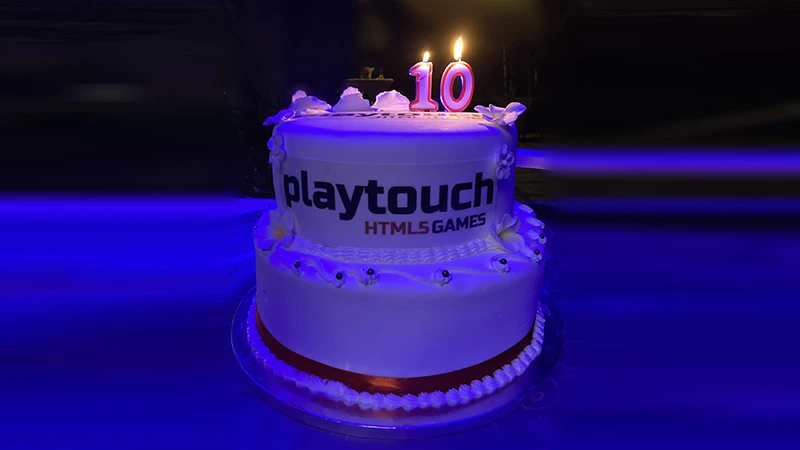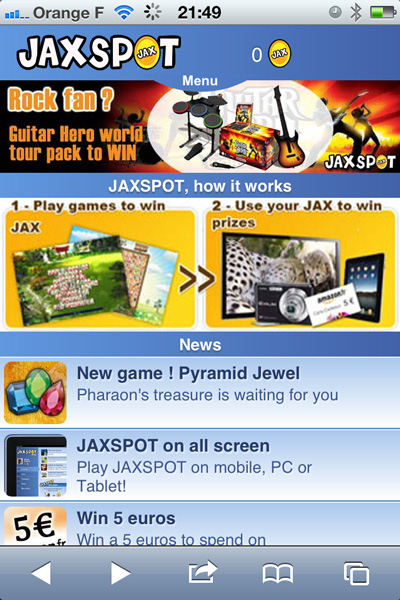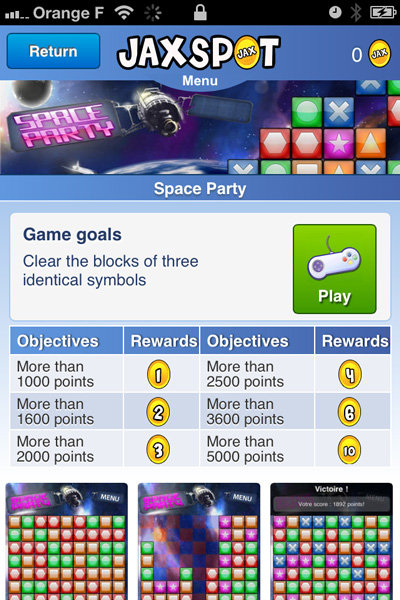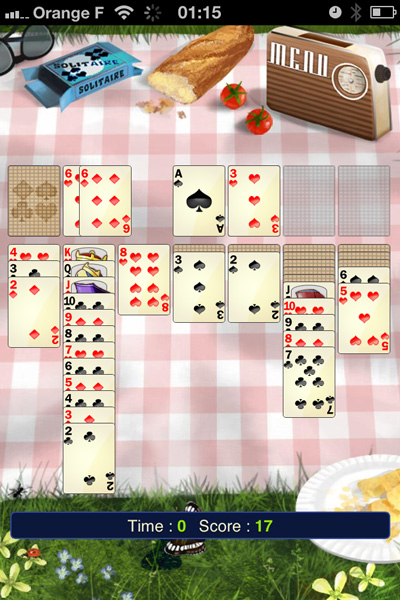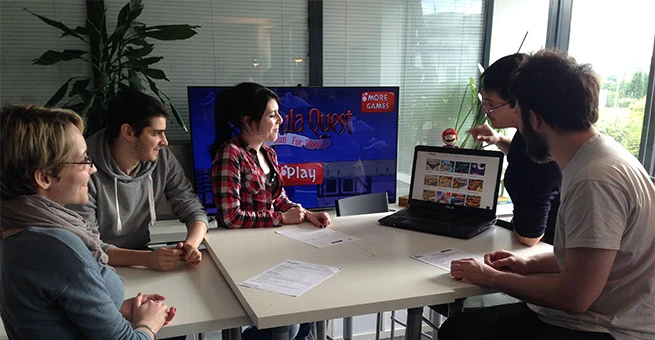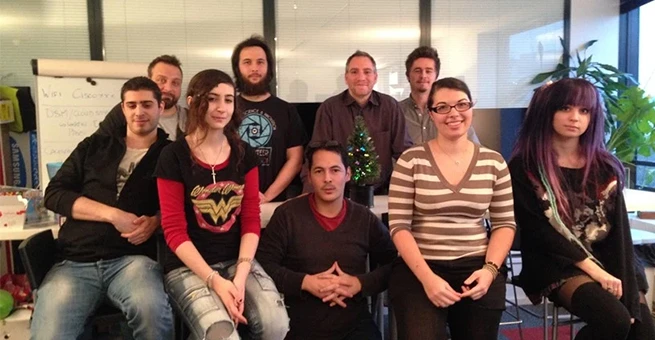For this special anniversary, I would like to tell the story of our team’s adventure over the past 10 incredible years. With many ups and downs, we’ve had fantastic encounters, miserable failures, disappointed hopes and improbable successes. In writing this, I can share my personal experience as an entrepreneur (I am usually rather reserved on the subject), and above all, highlight the team, the men and women, who have made Playtouch…
By Stéphane Hervé
2009
With 10 years of experience in the video games industry (Glu, Orange France, Creo, Microids), I finally decide to start my own business.
Mobile gaming is already booming with very promising market forecasts. Thanks to my professional successes at Glu and Orange France, I’m now ready to start as an entrepreneur and pursue my childhood dream of owning a toy store (“a video game business is almost the same, isn’t it?”).
With my friends and future associates, Jérôme (ex-Orange) and Olivier (ex-Glu), we are thinking about what we could bring to the market as a start-up, while avoiding a head-on confrontation with the big players in mobile gaming. We have neither the money nor the experience to fund a large studio and compete with major publishers. We want to be different, to have an original approach and positioning!
Jérôme had already made a study on games services to win prizes and gifts. This type of service is quite popular in 2009 on PCs, especially in France. However these offers do not exist for cell phones. We find this quite interesting. We also think we can rely on our network of B2B2C mobile distributors (telecom operators, aggregators, media…) to help us launch this service in France and internationally.
We polish the idea for a few months, and then we finally decide that we are going to move forward with this idea. We already have the name of the service: JAXSPOT.
It is at this moment that I meet Bruno, my future and faithful travel companion for the next 10 years. Bruno is finishing his last year as a student in a multimedia school in Paris and is looking for an internship. He is young and fierce, resourceful, and has a rare skill set that is perfect for our needs. I’m still so thankful today for this encounter. Not only for the fantastic person that Bruno is and for our friendship, but also for all his professional skills that have served Playtouch so much. Bruno joins the adventure as an intern, and quickly after as a freelance.
But Bruno, as gifted and hungry as is he, is not a developer at the time, and this is a skill that we still sorely lack at the end of 2009…
2010
Brainstorming between partners: design models, business models, monetization strategy, business planning … We are making progress on the concept but still have no developers to support us. I met some but couldn’t find the right fit with someone skilled and motivated to join us. Moreover, it’s difficult to sort out between good and bad developers without having the technical skills to judge. So I rely on David, a longtime friend, a passionate and talented developer living in Montreal to give me his feedback on the “candidates”. But as I sense, his feedback is not very encouraging on the profiles I present him.
Not to make our search any easier, in 2009 the cell phone market is extremely fragmented, with Java phones, BlackBerrys, and smartphones as we know today starting to hit the market. With so many different mini games consoles on which we will have to adapt Jaxspot and our games to reach a maximum of users. It’s also very difficult to find a qualified CTO to manage the front office and the back office, with many different technologies and languages. Finally, after a few months, David then asks me THE question that will change Playtouch’s destiny: “Why don’t you try to make this game service happen on mobile web instead? “
“Mobile Web”… “Mobile Web”… “Html”… The idea is running through my head. I discuss it again with David, Jérôme and Olivier and I look at what is being done in the mobile web space. Indeed, it is not stupid at all given that all mobile devices are or will soon have a web browser preinstalled. We are starting to see things happening on the mobile web and it seems promising. The main competitive advantage of html is that the same line of code should work on any web device in the same way. We develop once in html and our project should work everywhere. In fact, it’s an awesome idea! “1 code to rule them all” (I still laugh today when thinking back to this carefree and blind optimism).
David starts to really like the project and finally decides to join the founding team. David as CTO, Bruno as our Swiss Army Knife (the man of many skills!), myself on the Management/Business/Marketing side and Olivier and Jérôme as advisers (non-operational).
Time to move on!
I officially create PLAYTOUCH on November 5th, 2010, with 36K € of initial capital.
I am a big fan and so proud of the name we have chosen: PLAYTOUCH! It’s a name with real resonance, an air of “déjà vu” that sounds familiar to everyone. This name is also so representative of our business. I love it. Thank you Jerome!

1st Playtouch logo
Bruno and I are based in Paris, while David sets up a little studio in Montreal with Mathieu and Clément, 2 other developers. The development of Jaxspot can finally start. We end up meeting Nicolas, a web developer who will develop our first 12 games in JavaScript (solitaire, sudoku, mahjong, etc.) with the help of Philippe, our first graphic designer. Great, we are finally a real team of 7 full-time employees!
In December 2010, I finalize our first small 100K € fundraising in what I like to call “love money” (money from family and friends). I am also already starting to seek our next round of funding. We have a lot of ambition, a brilliant team and a solid Business Plan with a sales forecast of several million euros over the next 3 years. We have some innovative technology and a very original product with a subscription-based revenue model. The icing on the cake is that in November 2010, we sign a first distribution contract for Jaxspot with Bouygues Telecom, one of the 3 mobile telecom companies in France.
This will undoubtedly attract investors… Everything is going perfectly!
2011
As this is my first company, I’m trying to learn as much as possible from support structures, other entrepreneurs and meetings at trade shows. In 2011, Gilles, a mentor from an incubation structure who looks after us, tells me: “Stéphane, you know, you have to be careful. Creating a business, a new product, is not always easy. My advice: Plan 3 times your initial time forecast to develop your product, 3 times the money to finance it and 3 times less income than you expected “. Well, Gilles was right, the reality is exactly that … just worse!
Indeed, since raising 100K €, we are developing like maniacs, head in the handlebars. We are making progress, but too often I personally ask for product changes (product design, features, look and feel, etc.), which is really slowing down developers. I want too much, I ask for too many different things, Jaxspot is becoming too complex: a web portal, games, gifts, challenges with friends, real-time chat, etc. It is available on PC, tablet and mobile. On paper it’s a really great product, but what a technical challenge!!! I don’t realize it yet but I’m scattering and so is the team.
Moreover, while we thought we had an advantage with html, we finally are facing the fragmentation of mobile browsers (the standardized web html5 announced by the W3C consortium in 2011 is not there yet). We need to adjust our lines of code to be compatible with the main mobile browsers, and we are losing some precious time.
At the team level, after the euphoria of the start, we realize that the distance between Canada and France is not easy to manage. With jet lag and Skype chats, everything takes longer. Playtouch is lacking a real corporate culture, a group effect. It’s difficult to create this spirit, this momentum, 6000 Km away from each other. I would love for all of us to be together but it is not possible and we will have to make do with it.
In Q4 2011, we win a nice start-up competition that allows Playtouch to be hosted (free of charge) for 2 years in the JCDecaux’s office in Neuilly, a neighboring Parisian suburb… You’ll see how this will be important in the continuation of the Playtouch adventure.
On the financial front, it’s starting to get tighter at the end of 2011 because investors and business angels still don’t understand anything about our product. I am multiplying meetings in France and Europe. I’m convinced that our product is great and has great potential, but I’m hitting a wall. It has to be said that the culture of video game financing in France, in particular, is almost non-existent. I am told:
– “I don’t understand what is the difference between you and Ubisoft? “
– “Video games are for kids and they make you dumb”.
– “Anyway, a subscription service doesn’t work, it sucks. Look at Deezer and Spotify, it doesn’t work, no future …”
I’m going through some of the best here.
2012
Only one Business Angel group, “Investessor” offers to invest in Playtouch, but I now feel that we are probably not ready to bring business angels on board as they will probably be very time consuming with many questions (which I admit is normal). This also risks slowing us down even more. I finally don’t follow up. (They will end up investing in Voodoo a couple of months later. Congrats to them and to Alain, they really had guts).
Playtouch’s cash flow is decreasing every month and I really need to find a solution quickly. I start talking to my friends, my family and I realize that many people trust me and would be ready to invest in our next round. Interesting! So I decide to broaden my search to a few trustworthy people with whom I have already worked professionally, and there I make a decisive meeting for Playtouch. I have known Guillaume, Julien and Jonathan for 6 years as I was one of their clients, but I didn’t know that they had been so successful in the video game industry. They are indeed very “low profile”, invest a few tickets here and there and offer to invest 150K € in Playtouch (I had only asked for a 5K € investment…).
Awesome!!! With the “love money” on top of that and Bruno and I also putting some money on the table, we manage to raise 300K € in Q1 2012. Phew! It was about time because we now burn about 30K € per month, and we really needed this cash. Everything goes rather well, in spite of the delay. Really well. We are going to make it, for sure!
But the truth is that, without realizing it, we are rapidly approaching the precipice…
We finally manage to release a first Beta version of Jaxspot in June 2012, with a 1 year delay from the initial plan.
It’s far from perfect but it works. Well…it works technically speaking, which is already a real feat given the mobile web capabilities of the time. (When I think back, I can tell that Jaxspot was a real technical achievement). On the other hand, on the fun side, Jaxspot is not really great, but I don’t realize it because I’m so obsessed with my marketing ideas and my business plan. “It’s such a great idea, there are no competitors, and there is no reason why it could fail …” Actually, there are 1,000 reasons for Jaxspot not to succeed. In particular, the pleasure of playing is really missing in the service, but I don’t think too much, I keep my blinders on and keep going straight into the wall.
In 2012, our product positioning is totally opposed to market trends. It’s quite amusing to see the amazement, even dismay, of the industry regarding our choice of the Web for mobile gaming. Everyone swears by the iPhone and apps, while Playtouch is doing mobile web. All publishers are trying to send traffic to their games in the Apple app store to boost their rankings, while Playtouch is buying traffic on apps to redirect to Jaxspot’ s mobile website. I start a few user acquisition campaigns, mainly with Tapjoy, and it’s working quite well. We manage to generate really decent volumes at very low cost. In less than 4 months, we have 1.5 million visitors on Jaxspot and 200,000 registered players.
Very nice figures, at first sight, but the reality is less sexy: Player retention is very bad and monetization is not so good either.
We turn and we turn the subject in all directions but without finding solutions. We have to face the fact that Jaxspot is a big failure. It just isn’t fun enough and that’s why the players don’t come back. It becomes very problematic in Q4 2012 because we have just enough money left to finish the year and I have no idea how to convince new investors with such low numbers.
Together with David, we decide to cut our resources. Only Bruno and I continue, hoping for a miracle, while David goes back to his consulting activity, while ensuring the technical maintenance of JAXSPOT in his spare time. This is without a doubt the most difficult time for me during these 10 first years of Playtouch. We’re at the end of our rope. Playtouch has almost no money left and I personally have 150K€ debt on the company. In addition, I have the credit for my house to pay back and Ariane, my wife, is expecting our 3rd child by the end of the year. It really sucks!
All these people who trusted us – our parents, our friends, our relatives – are we going to have to tell them that we have failed miserably and that their investment is lost?
Bruno even finishes the year with a freelance web design mission for another company, just to scratch 2000 €. We really hit rock bottom.
2013
In January 2013, Bruno is back from his freelance job where he almost committed suicide 3 times a day from boredom. He is happy to be here with me again even if our situation is still quite precarious. However, Bruno’s enthusiasm is contagious, and our desperate situation forces us to be creative. It’s not an easy one but we start to think, and think more…
Our only source of income comes from a contract we signed in September 2012 with Digital Virgo Entertainment (DVE). For 1,250 € per month, DVE can use our 12 Jaxspot mini-games on their mobile game portal. It’s not a lot, but how important it is for the future in reality. In December, we also sign a 1 year license (4,000€) with Booster Media (now CoolGames) to operate the same 12 mini-games on their website (once again without using the Jaxspot service).
We end up thinking that maybe with these 12 mini-games available at DVE and Booster Media, we could also try to distribute them on Google Play just to see how they could perform. Ok, it’s an app store, but we know that we can technically wrap our HTML games as apps, so it’s possible.
Our games aren’t good enough for us to sell them, nobody would buy them and we don’t have the technical skills to integrate in-app purchases. (Nobody would spend their money on micro transactions in our mini-games either). So we simply decide to put ads in between plays. Once again, in early 2013, we move against the mobile gaming market flow as the revenue model is absolutely not focused on in-game ads. The market talks about premium and freemium, but “in-game advertising” is not yet popular, and even strongly discouraged by the OS owners as it is harming game quality.
David takes care of wrapping our HTML games into apps. We also use Bruno’s skills to integrate Adsense (Google’s advertising network) because it is the only web ad network that we know works for mobile (Bruno is still not a developer, but I have to admit that he rocks!).
At the end of January 2013 we launch our first game on the Google Play Store and we generate a very small revenue of 120 € through ads.
“… What if we launch the other 11 games to see if we make 11 times more revenue?”… 1,500 € per month in our current situation is always better than nothing. So we deliver 1 new game every week on Google Play. In February we reach 2,200 € in revenue, in March 6,200 €, in April 9,000 €… “Wow! We just hit something here”.
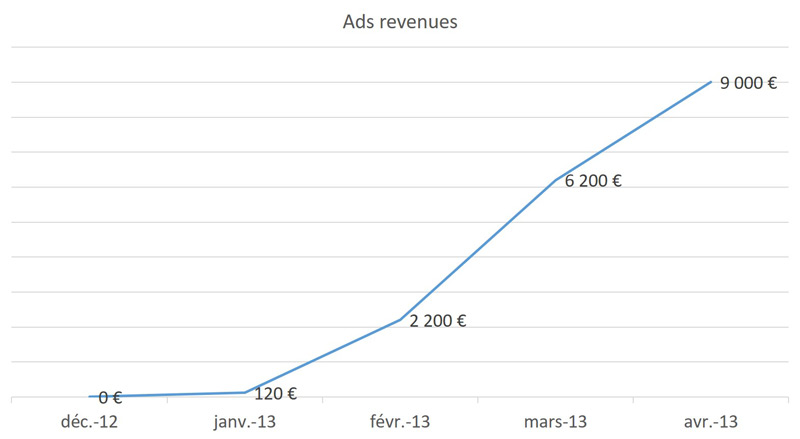
In fact, without knowing it, when Digital Virgo Entertainment asked us a few months earlier to be able to use the games independently of Jaxspot, they contributed to the pivot of Playtouch. DVE will remain as Playtouch’s very first business client, and 8 years later we are still partners. Thank you DVE for trusting us and still being our client 8 years later!!!
With a few very simple games we manage to have a quite decent audience on the Google Play store (without paying anything). In addition we monetize these players very well with ads. Is it that simple? If so, we just need more traffic to generate more income. And to have more traffic, we would need more games. However, we want to stay on html5 technology because we have managed to convince DVE and Booster Media, and we are starting to see other opportunities emerging with other potential partners. Moreover, html5 works everywhere and not just through App stores…
We quickly need a new game developer, preferably an inexpensive intern to get started. Bruno, once again wields his magic wand and brings us Tibo, one of his friends, a project manager profile, but in fact a true developer. He is very humble and has a very pragmatic approach. We tell him about our ambition to create 100 games as soon as possible. Tibo then gives us his vision:
– “if we want to make tons of games, we need an html5 game engine to ease and accelerate developments”. His choice will be CONSTRUCT 2, a great html5 game engine that we are still using in 2020.
– “If we want to make tons of games, we also have to develop a shell”, in other words a common core reusable for all games so we do not have to redo everything “from scratch” for each game. Tibo’s shell will then become one of the most important assets of Playtouch and save us an incredible amount of development time.
We decide to hire 2 graphic designers as interns and Tibo then starts the development of the first game using construct2: ALIEN KAMIKAZE. The result is bluffing compared to our previous games. It is moving, there are animations, it looks like a real little game and it is an HTML5 game.
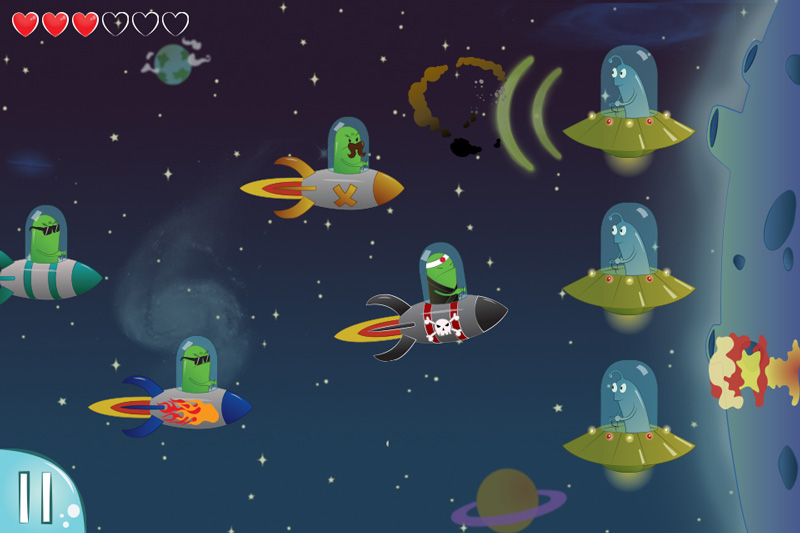
Alien Kamikaze
With the promising numbers on Google Play and this first “next gen” game, I’m willing to speed up production but I need to find some funding once again. I suggest to Jonathan, Guillaume and Julien to invest one more time with the objective of making 100 games with this new advertising revenue model. As incredible as it may seem, they continue to trust us and agree to invest again. I add the last of my savings into this round, and a couple of shareholders also decide to re-invest. I’m also trying to convince other investment structures, but I’m still getting fired up: “Honestly Mr. Hervé, you’re completely stupid, it’s impossible to develop 100 games. Where did you see that? You are ridiculous “.
I am not trying to push further. We settle for 130K € for this round and get by with it (it will without a doubt be the best 130K € ever spent at Playtouch).
For my part, I do believe in Playtouch like never before because the numbers are there to prove that this advertising revenue model can work. Now it is a matter of how well we can execute.
Playtouch’s momentum is accelerating at the end of 2013. Digital Virgo Entertainment likes our new HTML5 games and we sign a new contract which brings new recurring revenues to Playtouch. We also sign a few other competitors of DVE which validate our choice of making games in html5.
The new games on the app stores are not performing as well as the previous ones. It’s hard to know why we don’t perform as much on Google Play. However, this is not so much a problem because our revenue is now rising on other new distribution channels that are looking for HTML5 games (y8, spil, kik messenger, facebook, chrome webstore). I’m very happy that our revenue comes from several sources because our risk is spread amongst several channels.
2014
As planned in our last fundraising, we decide to accelerate by recruiting a small crew of interns to develop as many games as possible. This includes developers, graphic designers, game designers and sound designers, some full time, some part-time and some interns. Everything is in place to grow the team and accelerate quickly. What’s really great in France is that it is possible to find high quality profiles as interns. We then set up a very simple recruiting process:
– For developers, Tibo interviews them to see if the candidate has the right way of thinking and opening the right doors that will apply well to our game engine and our work methods. For this, before the interview he asks each candidate to come with a mini project made with construct 2.
– For graphic designers, a simple test with a pencil, a blank sheet of paper and an eraser. “Draw me a turtle, a car, and a small house in perspective. You have 30 minutes”. The important thing for us is to “spot” talented people. If the candidate is talented in drawing, then we will be able to help her/him to improve their skills in the digitalization of their work (Photoshop, colorization, animations, etc.)
– Last but not least, we try to evaluate the candidate’s attitude. We are not necessarily looking for the most talented people, nor the fanciest resumes, but really people who have a great attitude, who love what they do, who like to share with a team, who wish to progress and who like to listen. For us, those with the right attitude are bound to add a lot to Playtouch, much more than pure talents without the right frame of mind. We believe that when you have the right attitude, everything else follows more easily and more quickly, and that is why we put a great deal of emphasis on that.
The team is growing very quickly and Bruno and Tibo manage the new talents with a masterful hand. They manage to achieve incredible production goals. Each week, one pair made up of a developer and a graphic designer creates a mini-game from A to Z. The team starts on Monday morning and has to deliver the game by Friday afternoon. It’s intense, not always beautiful, not always fun, but most of the games are still cool. What is really interesting for the team, and especially for the interns is being able to work on lots of different mini-projects rather than focusing on just one game during a 6-month internship.
Playtouch team in Paris
Playtouch then starts releasing games almost as quickly as flipping burgers: 4 to 5 games per week, 20 to 25 games per month. There are games for everyone: Solitaire, Doner Kebab, Pony dress up, Stickman Fighter, The Wisp. Some are big flops, and others will exceed 10 million downloads. In less than 1 year, we exceed 100 games (“Honestly Mr. Hervé, you’re completely stupid, it’s impossible to develop 100 games. Where did you see that? You are ridiculous “)…
We signed a few additional contracts in the last months of 2014. The income from these new partners is not huge, but it helps ensure our survival. We are starting to offer some interns to continue the adventure with us as freelancers. Most of them accept; “Seems like it is not so unpleasant to work at Playtouch after all”.
Having freelancers is really good news for me, a good sign of the general state of mind, and a great opportunity for Playtouch to capitalize on resources in the longer term. We’re slowly but clearly moving up the ladder of competence.
Despite the growing number of our games, our revenue is struggling to really take off and our limited growth is not via app stores as we had imagined, but rather through new HTML5 partners.
I am therefore delighted once again to have chosen HTML5 for our games, because it gives us the ubiquity to seize any opportunity on any platform, device or partner. Moreover, HTML5 web standards are now more and more followed by web browsers and make the development of our games much easier.
In March 2014, during a trip to Singapore, I meet Gonzague, VP Business at Gameloft, whom I’ve known since Ludiwap (Gameloft’s first name in 2000). We have a coffee and I show him what we do at Playtouch, and our revenue model with ads. Gonzague finds our approach very interesting and less than a month later, we sign a partnership contract. Gameloft works a lot with mobile manufacturers to embed their games in mobile devices before they are shipped and sold to end users. But these games take up memory, require tests from the manufacturers, etc. Many drawbacks can be avoided with Playtouch by embedding a simple icon with a web link to our online game service with 100 games. Gameloft likes it and starts to send us tons of players on a white label website we are running and monetizing with ads.
I travelled 10,000 km away from France to sign a major partnership with a company that is actually a few minutes by metro from our new office…
The new contract with Gameloft is starting to get our sales off the ground. The revenue share is not really in favor of Playtouch but the volume is there, so we’re happy. It gives us a bit of cash flow and allows us to settle down a bit to consider the strategy for the rest of the journey.
We still have several interns, but above all, we now have 6 full-time freelancers. That is a concern for me, because in France, it is not possible to have full-time freelancers for too long because there is a risk that the labor administration will reclassify these contracts as “employees”, which would force us to pay much higher payroll charges. But we are clearly not yet able to bear these extra costs without putting Playtouch in great danger again.
I therefore consider 2 options: either to raise new funds to finance these additional payroll, or find a solution to keep our costs at the same level.
I’m thinking that it’s going to be very difficult to convince investors because I’m not sure that our model of making hundreds of games with advertising revenue really excites them. Therefore, I consider that the second option is obvious, but here in France it’s clearly not possible to keep our current cost structure without having a sword of Damocles hanging over our heads. The solution would be to relocate the whole team to a country where we could keep reasonable expenses. I discuss this option with Bruno and Tibo (I can’t imagine setting up a new structure elsewhere without them). They are not against it but they are married and the choice is not only theirs to make.
I then start to investigate which countries we could settle in. Countries where we could develop our skills, recruit locally, while maintaining a pleasant quality of life for our employees. I take North America and Europe out of the equation right away (too expensive, or too small of a difference that wouldn’t justify so much hassle). I’m rather focusing on Asia but it seems very complicated. It’s either very difficult to get visas for foreign workers, or there’s a language barrier as locals do not speak English well. Also, shareholding is a problem because you need a local partner, so there are many issues that push you to take the plunge.
Malaysia seems to be the only serious option for Playtouch. And that’s when I started talking about this project to Eric, a web entrepreneur that I had met during our stay at JCDecaux in Neuilly 2 years ago. He has been living in Mauritius for the past year and I ask him if he thinks this could be an option for Playtouch. He is not very confident about the possibility of recruiting the needed profiles locally. On the other hand, he is very positive about the quality of life and about the country that is very “entrepreneur friendly”. I decide to further investigate and I travel to Mauritius in November 2014 to spend a few days, take the pulse of local life and gather as much information as possible.
My stay is really fruitful. Mauritius is superb with magnificent landscapes, and the sea and the lagoon are sublime. The country is in full economic development and seems to ease establishment of companies like Playtouch. French and English are the two official languages, (in addition to Creole, which is spoken by locals), which will ease the integration of French employees if we come. There are some very good French schools, and the country is very safe.
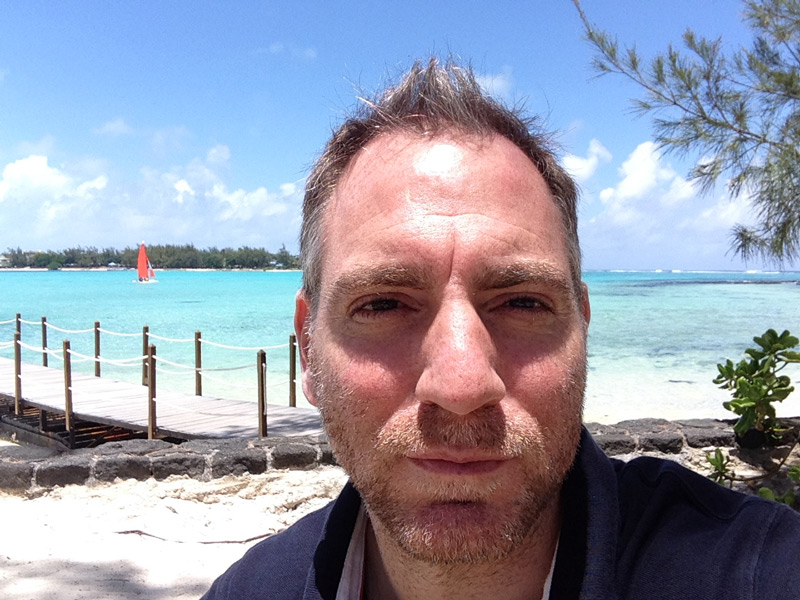
1st time in Mauritius
I come back to France with a very good picture of Mauritius that I share with Ariane. We make up our minds very quickly to jump into this new and very exciting exotic adventure while imagining that Mauritius will also be a very pleasant living environment for our 3 boys, now aged 2, 7 and 9.
Ok, well this is all great on paper, but now I have to convince the team to follow me, 12,000 km away from Paris … it’s all up to them.
Mid-December 2014, I organize a team meeting with all the staff. The objective is to explain precisely and in a completely transparent way how Playtouch works today (I share my salary, the turnover of the company, our costs, our customers, etc.) and what is the strategic vision for the future. I explain the need to change the status of our freelancers in France and therefore my desire to create a subsidiary abroad. I start by presenting countries in which I hadn’t planned to go anyway, such as the United States, Russia or China and their very unflattering portraits. The lack of objectivity is obvious, but it is to better serve my diabolical drawings for the end of my presentation. The option I have chosen is Mauritius and I now show magnificent photos, infrastructures in full development, beaches, food (for Bruno …), culture, music…
The team is at the top, smiles on their faces, they’re totally hallucinating! “What? Are we going to move there? Wow, that’s awesome!!! When do we leave? “. I am surprised by such spontaneous enthusiasm, and even if the bet is not yet won, it’s already a good sign. We all go to celebrate this at the Indian restaurant around the corner (Many Mauritians have Indian origins …).
2015
August 2015 is the big departure for Mauritius. It has been 6 months since I started working hard on the organization of our move abroad: the creation of the Mauritian subsidiary, opening of bank accounts, visas, school enrollment, etc. Playtouch is doing pretty well. Our partnership with Gameloft is cruising, and we have just signed a contract to develop 5 games for Disney. It is not really in our business model to develop on behalf of others, because I find that this is not necessarily where we will create the most value for Playtouch, but it is still nice to have Disney in our collection of partnerships.
Of the 8 freelancers we have, 6 decide to continue the Playtouch adventure in Mauritius. The personal situation of the last 2 unfortunately does not allow them to join. I’m delighted with the team’s loyalty because it’s another proof of the good atmosphere of this group and I’m super proud of it. Proud but also with an extra pressure on my shoulders because I’m a bit responsible for their well-being in their new life abroad. We are almost becoming a small family.
I was expecting a lot of hardship, administrative paperwork, logistical problems, but finally the arrival of all the team and spouses in Mauritius is going really well. Of course we have lots of amusing stories on a daily basis, but quite frankly everything is going wonderfully. I think this is both the result of a lot of preparation (when I compare to other companies or other expats moving to Mauritius, I realize that we have done our homework really well). It is also the result of great team solidarity on a daily basis.
We all find accommodation quickly in the north of the island and singles decide to get together and take a 4-person share house. For the same budget as in Paris, we find rentals with swimming pools, close to the sea … it is paradise!
In the end, the most difficult thing is to find an office that suits us. From September to November, we work at my place. Fortunately the house is big enough for the 7 of us to fit in the living room. It’s still a bit of a mess with my 3 young sons and the neighbors’ children playing and jumping in the pool while we are developing our games. But it’s fun and it is part of the folklore of this new life.
We end up finding our office in Grand Baie, a small open space of 80m2, a stone’s throw from the sea, perfectly located for a break to stretch our legs while admiring the incredible lagoon.
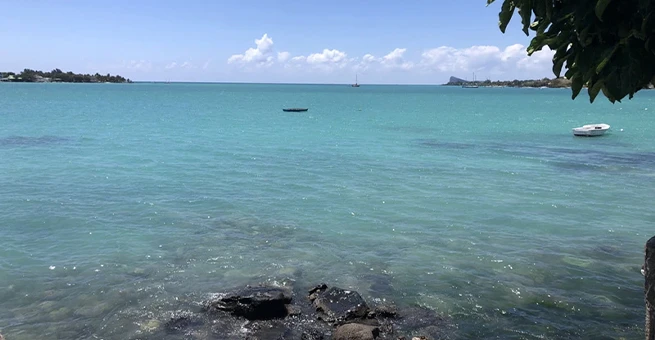
Playtouch office walk view
We quickly recruit our first Mauritian employees, using the same process as in France. Their technical background is lower, but we are ready to take the time to help and train them as we previously did in France. We grow the team up to 15 people over the next few months. We are developing less games than before for 2 reasons: our team is less qualified with the new resources, and at the same time we are also trying to improve the average quality of our games, which increases production time.
2016
Playtouch’s turnover is fairly stable. Our partnership with Gameloft, which represents a large part of our business, is declining because Gameloft is starting to develop its own Html5 games which replace those of Playtouch in their catalog. During this time, we have also signed several new smaller partnerships, not big contracts but once again we smooth out the risk.
2017
At the beginning of the year, we are starting to see some Playtouch games that stand out on the app stores, and in particular on Google Play. Our Stickman Fighter Epic Battle game has a certain success on different platforms. This game does not monetize very well, but the volumes are impressive, especially as we do not invest in marketing. It’s purely organic traffic and this game is now generating nearly 300,000 downloads every month on Google Play in the first half of 2017.
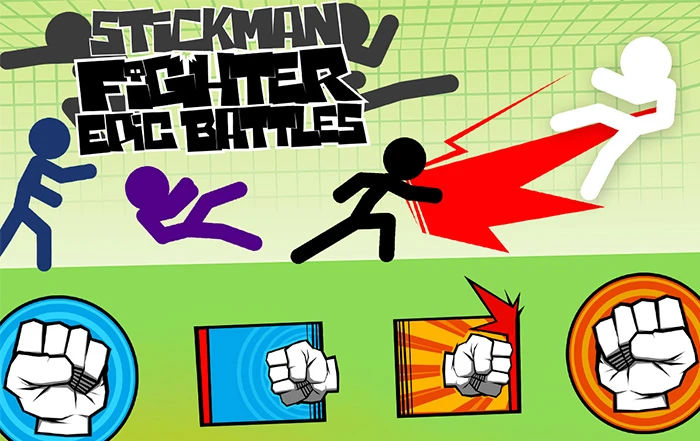
Stickman Fighter : Epic Battle
In May 2017, the total downloads of all our games reach 1.1 M downloads from Google Play. Google then becomes our main source of income.
On the other side, our revenue with Gameloft has declined significantly over the months, but fortunately this drop is offset by our growth with Google.
Playtouch is break even.
2018
In June 2018, it’s a disaster for Playtouch!
Google Play suddenly changes the search algorithms on its app store and the visibility of our games drops immediately. It’s very annoying because there is absolutely nothing we can do. I know many publishers in the same situation. Some are so affected that they must immediately reduce their staff or even shut down their company altogether.
Playtouch’s revenue with Google suddenly drops by 80%. Ouch! We still have some cash in the bank but we are losing money every month. We have to react quickly because in 6 to 8 months, at this burn rate, we will run out of cash. Did someone say being an entrepreneur is like being on a roller coaster?
Once again, I tell myself that our door of salvation is html5, which allows us to consider several options to help evolve our business.
The observation is quite simple: A large part of our current business relies on high volume of players coming to our games “for free”, but as an executive at Google confirms to me, we can no longer expect to have high volumes of traffic for free in the future.
If we can no longer count on large volumes of players with Gameloft nor with Google to display advertising, then we need to do user acquisition ourselves and keep the players playing our games for longer when they are in.
This means making better quality games with higher retention and better monetization strategies (ads but also In-App Purchases).
We therefore decide to go back to basics, make good “ever green” games, simple, fun to play, less original but targeting a large audience of players: Solitaire, Mahjong, Sudoku, board games, letter games, etc. We are almost starting again from scratch but with the desire to greatly improve the average quality of our games.
Simultaneously, I am working hard to sign new distribution partnerships and trying to develop business with our current partners. I’m multiplying meetings and trade shows but I know that all this will take time if it comes to fruition.
In September 2018, I inform shareholders that the situation is very tense. None of them complain, they continue to trust us, ask questions to understand and ask how they can help us. How lucky we are to have them and I tell myself that the story would surely be very different and more dramatic if we had VCs or business angels in our capital. This is a subject that I had discussed with Kristian Segerstrale in San Francisco months ago. Kristian is probably the most brilliant entrepreneur in the video game industry I know; I drink his advises like good wine: “Frankly, if you can avoid raising money, just don’t raise, because it is often a lot of additional pressure that can sometimes lead to bad decisions, especially in our industry which is nevertheless very complex. It all depends on what you are looking for, but if your business is going well, if you are having fun, and if you can continue to kite surf in Mauritius, well maybe life is worth living… “.
Of course we are short on cash but Kristian was so right because the time I am currently saving by not justifying a whole bunch of choices to shareholders allows me to fully focus on business development.
My investment will eventually pay off by the end of 2018. The various actions taken in July are starting to bear fruit. New and older partners are now partially compensating for most of the revenue drop from Google and Gameloft. Our new games are also performing much better, both on the app stores (Google and Apple) and with most of our independent distribution partners. It’s interesting because for the first time since the creation of Playtouch, we are breaking even without relying on one big partner. Things are looking up.
2019
Everything is looking pretty good except that we are short of cash in February 2019. If we are back in balance, our deadlines with our partners will put us in the red. Once again, I can count on the great support of one of our shareholders who lends us 1 month of cash, just enough to bridge the gap with future payments. In Q1 and Q2 2019, our revenue grows every month, but I am still extremely cautious with our expenses. We have come too close to the precipice again.
2019 is really great: our business is growing with most of our partners, the quality of our games continues to improve and our cash flow is consolidating. For my part, I’m taking a breather because I finally feel that we now have a much more stable business, and that’s good for my morale! Moreover, we moved into a new house 2 years ago with my family, we got closer to the sea, and since then I have been commuting to the office with my Stand Up Paddleboard, also good for morale. Almost every morning, I take my waterproof backpack, my paddleboard and my paddle, walk 4 minutes to get to the beach and I paddle about 25 minutes to get to the pontoon near the office. It’s just an incredible pleasure to cross this lagoon in the morning and to do the same trip back at sunset. Wow, I love that! Without a doubt, my biggest milestone at Playtouch since 2010 (lol).
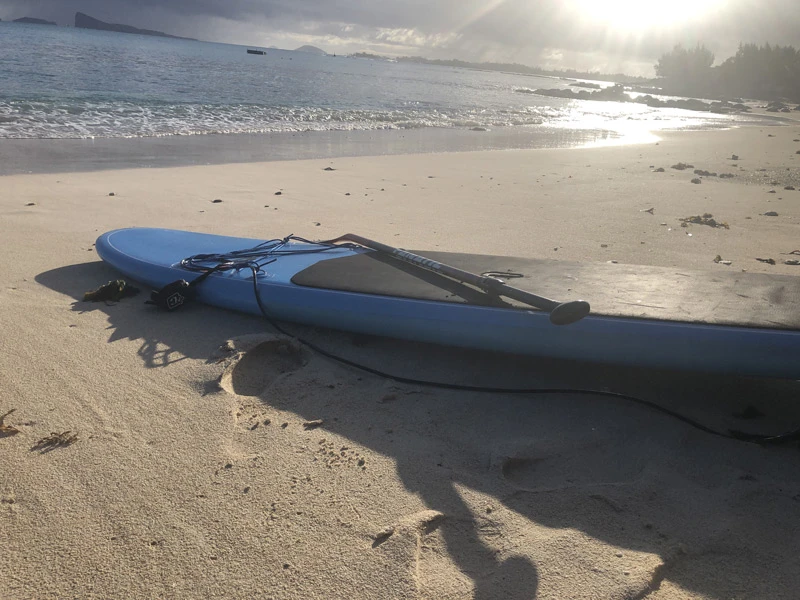
Stephane’s paddle board
2020
If 2020 is not over yet, this year will be, whatever happens, an excellent one for Playtouch (despite Covid). Playtouch games are performing more and more, everywhere, with all our partners, and this allows us to now have more than a year’s worth of cash in the bank. We have a lot of ideas in mind and I’m very confident for the future because we master the subject of html5 very well, even if we remain modest and pragmatic. It is indeed out of the question to get excited and show off.
For example, we are now starting to invest in new, more technically ambitious projects such as real-time multiplayer games or narrative games. Charles, our “lead developer”, is the man on R&D. He started at Playtouch 6 years ago, as an intern of course. From the start, he really helped Playtouch reach the next level each year, notably with his famous CFM (“Charles Fucking Machine”) which allows us to automatically generate games files for each distribution partner. When you have over 300 games, and dozens of distribution channels to deliver, I can tell you that we really appreciate “automation” and therefore Tibo’ s SHELL and Charles’s CFM.
In 2020 and 2021, we are and we will of course continue to develop our portfolio with casual games (our “ever green” games).
The end… or just the beginning!
10 years later, there are 12 of us on the team: 5 French and 7 Mauritians. While the team has not grown over the last 2 years, this is not the case for the families of our team members, with 6 births in the last 3 years. It is fun to note that all the French that moved to Mauritius had a baby (except me, but I already had 3 …). Whatever happens to Playtouch, it will remain as one of coolest achievements of our installation in Mauritius. Another great achievement is the amazing progression of Mauritians working at Playtouch. They arrived with a really light technical background, but were full of goodwill and with that positive “attitude” that is so dear to us. They made great progress over time and I’m now so proud of them and the games they are able to create today. It is really impressive!
What a team!
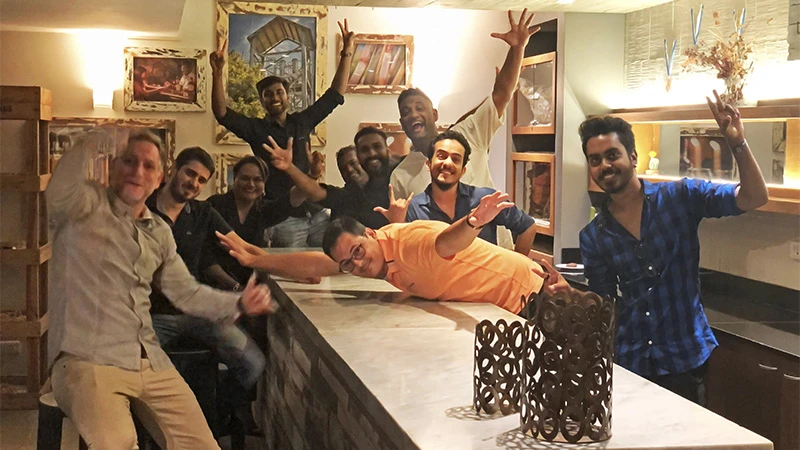
Playtouch team in Mauritius
10 years already … I would never have imagined such a journey because it was not at all what was written in the roadmap at the beginning. I can’t say we made simple choices, but that’s what made our path so original, and so fun in fact. I have so many good memories, some not so good of course, but I especially cherish the meetings and exchanges with all the people who took part in the Playtouch adventure: our families, friends, investors, industry professionals, but also and above all, Playtouch’s employees, freelancers and interns whom I will never forget.
November 5th 2020, like Flamboyant trees in Mauritius, Playtouch is beginning to blossom magnificently and I just can’t wait to see what will happen over the next 10 years…
Stéphane

Flamboyant tree in Mauritius
